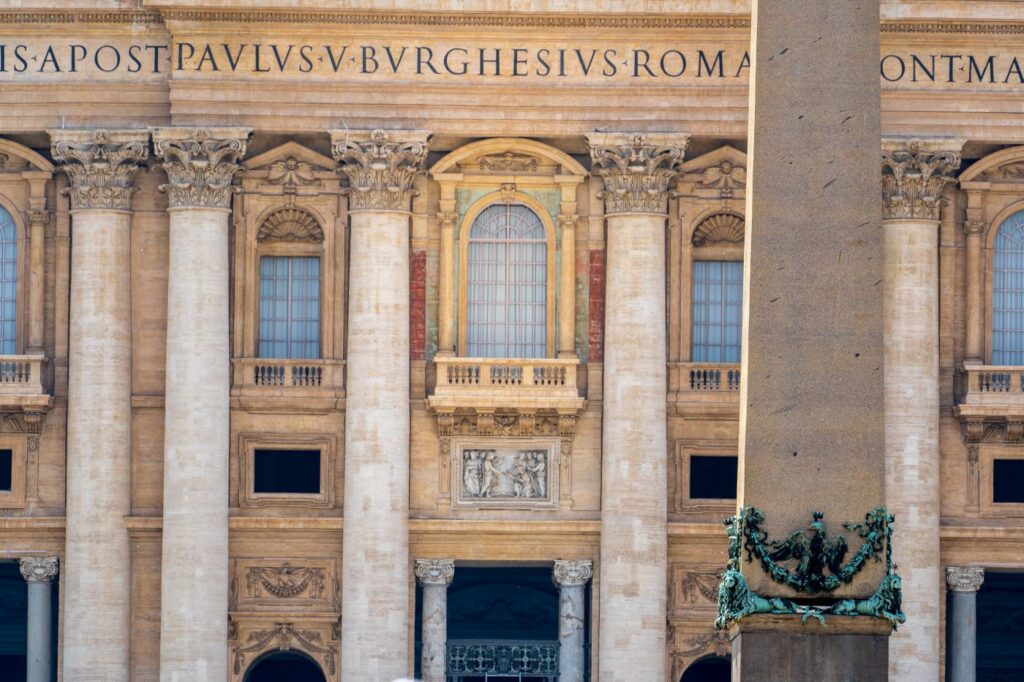For Niccolò Machiavelli, Pope Julius II was the model Renaissance prince. He was highly intelligent. He was skilled at diplomacy, politics, and war. He was a visionary patron of the arts. Julius was also, according to those who served him, intensely vindictive. He was moody, humorless, and coarse, with a violent temper. He had a gift for making enemies and alienating the less worldly and more committed Christian faithful. And the result was predictable.
A year after his death in 1513, the tract Julius Exclusus (“Julius Excluded From Heaven”) made its debut in Europe. It was an instant hit, both fiercely satirical and massively popular. In it, the deceased Julius shows up at the gates of heaven and tries to bully his way in by listing all of his achievements, his papal authority, and his earthly accolades. St. Peter is unimpressed and turns him away. Julius leaves, blustering.
Julius Exclusus was written anonymously, and for good reason. The author was very likely Erasmus of Rotterdam, and Erasmus lived in an age when skewering popes and kings could lead to an unhappy “accident.” We live in different times. We face different issues. At least in the democratic West, critics of authority today—ecclesial and otherwise—don’t typically fall out of high-rise windows or mysteriously drown in puddles. At least not yet. Which is good news for John Rist and his new book, Infallibility, Integrity and Obedience: The Papacy and the Roman Catholic Church, 1848-2023.
Rist is a Catholic convert and, like Erasmus, a serious scholar. His career includes a large and admirable body of work in the classics, ancient philosophy, and Christian theology and philosophy. Unlike Erasmus, alas, prudence is not Rist’s strong suit. In April 2019, Rist was one of nineteen names on a public letter to bishops of the world accusing Pope Francis of heresy. The letter was excessive in tone and weak in substance. It backfired on the signers’ reputations. And the incident casts a shadow on the author’s latest book, which has its own regrettable flaws.
Start your day with Public Discourse
Sign up and get our daily essays sent straight to your inbox.The target of Rist’s text is a set of “serious unresolved problems in the understanding and governance of the Church itself.” These are rooted in the growth of “excessive papal power” that breeds subservience among the baptized. The result has been the reduction of morality in Western Christendom to mere obedience. And over time, argues Rist, this has damaged the mentality and the integrity of Catholic clergy and faithful alike. An inflated sense of papal infallibility, cemented into ecclesial life at Vatican I, “could not but produce (and was intended to produce) a relationship between pope and Church . . . very different from that which pertained hitherto.”
Put simply, Rist claims that
. . . especially since the First Vatican Council, Catholic teaching . . . has come to be seen as too dependent on the will and authority of the Roman bishop . . . [resulting in] an unwarranted respect for immediate utterances of the Supreme Pontiff even if these might appear contrary to both Scripture and Tradition intelligently understood. That in turn has encouraged an excessively autocratic–at times even domineering–attitude at the top and a self-deluding servility easily identifiable as plain bad faith among the “lower ranks.”
The story Rist tells does have merit. The background he provides to Vatican I and the adoption of the papal infallibility doctrine is valuable and engaging. The nineteenth century was a time of revolution and strong anti-Church sentiment. Pius IX convened Vatican I in 1868 as a hostile kingdom of Italy encroached on the Papal States. The council disbanded in 1870 with the fall of Rome and the collapse of the papacy’s temporal power. Many of the council bishops who supported some form of papal infallibility did so out of doctrinal conviction. Many others did so from “an intense sympathy with the predicament in which Pius had found himself.” Still other supporters, whatever their reservations, acted more broadly in the interest of the Church, “particularly in its opposition to the modern world.” The unintended result was “an episcopal servility that was to become a pattern.”
For Rist, problems with papal infallibility, as defined by Vatican I, have dogged every papacy since Pius IX. For example, his chapter on John Paul II—whom he clearly respects—is tellingly entitled “Celebrity Autocracy.” Until now, the damage done by an exaggerated sense of infallibility has been masked by a line of adequate to outstanding popes, all of them committed to what Benedict XVI called a “hermeneutic of continuity.” The trouble happens when a pope has very different ideas and a very different direction from his predecessors. It becomes “disloyal” to challenge the resulting rupture. Rist’s judgment on the Francis pontificate will thus surprise no one. His chapter on the Bergoglio papacy is titled “Perón Meets Ignatius: The Choice Against Tradition.”
One of the key flaws in Rist’s text is its polemical spirit. There’s a caustic undercurrent throughout the book that weakens its narrative. His argument often seems too negative, too sweeping, or downright confusing. His attitude toward Vatican II seems ambivalent. He also falls into awkward, easily avoidable errors. He suggests that Karol Wojtyla played little role in Vatican II when in fact he had a significant hand in perfecting Gaudium et Spes. He describes the former Congregation for the Doctrine of the Faith as the “Congregation for the Defense of the Faith.” He classes John Paul II’s text Ordinatio Sacerdotalis as an encyclical when it was an “apostolic letter.” These can seem like minor mistakes, but they accumulate to imply an overeager prosecuting attorney and a hanging judge, rolled into one.
While a book like John Rist’s is diminished by its flaws, it’s not entirely unfair about our current moment.
Having said all of the above, Rist’s concern about “creeping infallibility,” and the kind of overweening papacy it can breed, can’t easily be dismissed. Whatever their flaws, Paul VI, John Paul II, and Benedict XVI used their authority in a centripetal way. They each sought to pull a centrifugal Church back together after Vatican II. The Francis papacy has a different spirit. There’s a unique kind of irony in a notion like “synodality,” which risks further fragmenting a Church already under great external pressures, being championed by the most authoritarian pope in decades. Thus, Rist is probably right that
a model must be constructed whereby the pope is clearly recognizable as the focus of doctrinal unity but which will simultaneously provide a structure for his activities [that] can inhibit the kind of abuse of office which–combined with and encouraging the passivity of too many Catholics–has threatened the Church since papal infallibility was defined at Vatican I and has now seriously infected it.
If that sounds like a disguised form of conciliarism, it needn’t be so. The primacy and authority of the Petrine office are vital to the Church—so long as Peter remains faithful to the Word of God and consistent Catholic teaching. In ensuring Peter’s faithfulness, diocesan bishops are more than simply franchise managers of “Catholicism Inc.” They have the duty of obedience to the Holy See in all things true to the faith, yes. But they have no obligation of unthinking agreement. The obedience of bishops should be shaped by the candor of mature adults.
I know from experience the instinct to avoid such candor. Rist might describe it as episcopal servility or cowardice. Far more often it’s a prudent fear of scandalizing the faithful and causing division. But I’d argue that, at this point, we’re well past worrying about such things. The papacy and the Vatican will look very different in the decades ahead whatever we do, if only because of finances. The Holy See in its current form is unsustainable, and shoring up structures is not our greatest challenge. The overriding issue facing the Christian world today is not a matter of money or office space. It’s anthropological, not structural, and it’s summed up in Psalm 8, verse 4: Who and what is a human being? What constitutes our human nature and dignity? Are we created or self-creating? What, if anything, do our bodies mean? Are we embodied spirits and organic wholes, or autonomous wills wrapped in disposable, remoldable clay? A “synod on synodality” can’t begin to address any of this.
We need to acknowledge that too many critics of Francis speak from an anger that defeats itself and ends by being unjust. His commitment to the poor, his emphasis on mercy, his passion for accompanying the lost and alienated, and his willingness to reach out to the margins: all these things are gifts to the whole Church. They deserve our gratitude and praise. So does his teaching on issues like gender, the sanctity of life, and bioethics . . . much of which is ignored by the mainstream media.
It’s also a fact that his overreliance on the Society of Jesus is unhealthy. He’s intolerant of even respectful disagreement. His manner can often seem mean-spirited. His complaints about the Church in the United States are insulting and uninformed, and they embarrass the dignity of his office. And—most regrettably—his ambiguity on matters of doctrine creates confusion and feeds division in the Church when we already have a surfeit of both. If saying these things is “disloyal,” then so is the truth.
I’m old enough to remember, quite vividly as a child, Pope Pius XII. I pray for him, along with every pope of my lifetime, every day. That includes Pope Francis—wholeheartedly. And yet, while a book like John Rist’s is diminished by its flaws, it’s not entirely unfair about our current moment. One can’t help but wonder if somewhere a young Erasmus has the draft of a new Exclusus in his drawer. The original was withering. We should hope that the Church in our day will have a kinder legacy.
Image by Bulent and licensed via Adobe Stock. Image resized.














